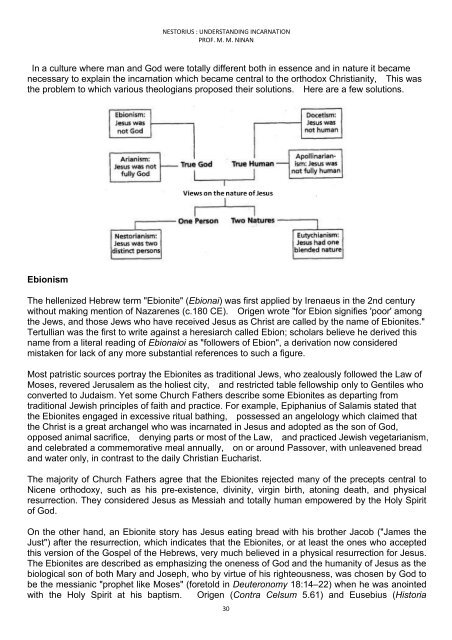Nestorius
Create successful ePaper yourself
Turn your PDF publications into a flip-book with our unique Google optimized e-Paper software.
NESTORIUS : UNDERSTANDING INCARNATION<br />
PROF. M. M. NINAN<br />
In a culture where man and God were totally different both in essence and in nature it became<br />
necessary to explain the incarnation which became central to the orthodox Christianity, This was<br />
the problem to which various theologians proposed their solutions. Here are a few solutions.<br />
Ebionism<br />
The hellenized Hebrew term "Ebionite" (Ebionai) was first applied by Irenaeus in the 2nd century<br />
without making mention of Nazarenes (c.180 CE). Origen wrote "for Ebion signifies 'poor' among<br />
the Jews, and those Jews who have received Jesus as Christ are called by the name of Ebionites."<br />
Tertullian was the first to write against a heresiarch called Ebion; scholars believe he derived this<br />
name from a literal reading of Ebionaioi as "followers of Ebion", a derivation now considered<br />
mistaken for lack of any more substantial references to such a figure.<br />
Most patristic sources portray the Ebionites as traditional Jews, who zealously followed the Law of<br />
Moses, revered Jerusalem as the holiest city, and restricted table fellowship only to Gentiles who<br />
converted to Judaism. Yet some Church Fathers describe some Ebionites as departing from<br />
traditional Jewish principles of faith and practice. For example, Epiphanius of Salamis stated that<br />
the Ebionites engaged in excessive ritual bathing, possessed an angelology which claimed that<br />
the Christ is a great archangel who was incarnated in Jesus and adopted as the son of God,<br />
opposed animal sacrifice, denying parts or most of the Law, and practiced Jewish vegetarianism,<br />
and celebrated a commemorative meal annually, on or around Passover, with unleavened bread<br />
and water only, in contrast to the daily Christian Eucharist.<br />
The majority of Church Fathers agree that the Ebionites rejected many of the precepts central to<br />
Nicene orthodoxy, such as his pre-existence, divinity, virgin birth, atoning death, and physical<br />
resurrection. They considered Jesus as Messiah and totally human empowered by the Holy Spirit<br />
of God.<br />
On the other hand, an Ebionite story has Jesus eating bread with his brother Jacob ("James the<br />
Just") after the resurrection, which indicates that the Ebionites, or at least the ones who accepted<br />
this version of the Gospel of the Hebrews, very much believed in a physical resurrection for Jesus.<br />
The Ebionites are described as emphasizing the oneness of God and the humanity of Jesus as the<br />
biological son of both Mary and Joseph, who by virtue of his righteousness, was chosen by God to<br />
be the messianic "prophet like Moses" (foretold in Deuteronomy 18:14–22) when he was anointed<br />
with the Holy Spirit at his baptism. Origen (Contra Celsum 5.61) and Eusebius (Historia<br />
30

















